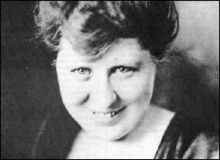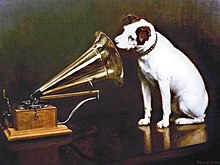


Ada Jones
Source: Library of Congress
Ada Jones is the first female popular recording artist in the United States listed in the VF History. Well, then, to preface this article with a few brief words concerning early commercial recording, since it's recording which put the boom in popular. The first cylinder recordings were etched on tinfoil by Thomas Edison in 1877, which proved that it could done, though not a lot else until Edison traded tinfoil for a surface of brown wax and invented a phonograph on which to play them. Eleven years later he was ready to found the Edison Phonograph Company in 1888. Twenty years later Edison's technologically superior Amberol brand, a long-play cylinder of four minutes rather than two, entered the market in 1908. The Blue Amberol brand went into production from 1912 toits demise in 1929. The Edison Company entered into producing flat discs rather late with its Diamond Disc Record in 1912 until 1929. Being incompatible with Victor equipment, then late entrance in 1927 into electronic rather than acoustic recording, spelled the doom of the Diamond Disc which major competitors, Columbia, Victor and Brunswick, had been producing since 1925. Brunswick wasn't founded until 1916, so it wasn't around to compete with Edison's cylinder enterprise as had been Columbia founded in 1889.
Disc recording had been invented a decade after cylinders in 1887. The Berliner label was the first to distribute them, founded by Emile Berliner who had also invented disc recording and the gramophone, the first getting pressed in 1894. It was 1900 that Nipper, the dog quizzically gazing into the horn of a gramophone, first appeared on the back label of a Berliner disc (not issued with tracks on both sides until 1908). It became the logo of The Victor Talking Machine Company when Berliner formed it in 1901 with Eldridge Johnson, its sister in the United Kingdom called His Master's Voice (HMV) founded the same year. Victor became RCA Victor when it was purchased by the Radio Corporation of America in 1929. The image of Nipper actually first arrived in an 1898 painting by Francis Barraud titled 'His Master's Voice'.

'His Master's Voice'
Painting by Francis Barraud 1898
Columbia, which was Edison's major competitor in cylinders, entered into disc recording in 1898. Edison's manufacture of Amberols (1908) was in defiance of discs overtaking cylinders in popularity during the first decade of the 20th century, so much so that Columbia exited the market in 1912, leaving the cylinder to history the same year that Edison came out with Blue Amberols, yet pushing cylinders full steam ahead while at once making a bid on the flat disc market with Diamond Disc technology. Such is what the gowns and suits of the recording industry were up to toward putting "popular" in popular music. Granted, just about everyone agreed that early acoustic recordings didn't sound very good, an estimate that didn't need electronic recording to compare them to. But they were close enough and could be disseminated to a wide audience.
Ada Jones was born in just the situation to become the first female "star" of the recording industry, the first pink bang for a buck. Born on 1 June 1873 in Lancashire, England, Jones was six when her family brought her to Philadelphia, seven when she began performing, albeit as an epileptic that was a trick to handle. She is believed to have first recorded on cylinder with the North American Phonograph Company in 1893 w 'Sweet Marie' (North American 1289) and 'The Volunteer Organist' (North American 1292) yet extant.
DAHR begins its sessionography of Jones on disc on 29 December 1904 per 'Mandy, Will You Be My Lady Love?' (Victor 4231), 'You Ain't de Man I Thought You Was' (unissued), 'Reuben and Cynthia' (Victor 4304 w Len Spencer ) and 'The Hand of Fate' (Victor 4242).
The popularity chart was well in existence at Jones' time, arising with the advent of commercial cylinder production in the last decade of the 19th century, largely to the purpose of advertising. Though the gathering of data for early charts preceding Billboard's first national chart in 1940, especially as early as Jones, has come under scrutiny, there are probably a lot which ring true in the lists. Music VF and TSORT have Jones delivering her first big bang in May of 1905 per 'My Carolina Lady' (Edison 8948) at #3. 'The Moon Has It's Eyes on You' became a top seller at #6. Another 42 Top Ten tracks followed to as late as April of 1917, the same month that the U.S. entered into World War I, w 'M-I-S-S-I-S-S-I-P-P-I' reaching #9. Well here to note that amidst the fare of early popular music in the United States was the coon song. Jones is subject to removal from YouTube for hate speech, having recorded several of them. Two of such were 'If the Man in the Moon Were a Coon' in 1907 and 'Oh! You Coon' in 1908. The etymology of "coon" may be two-fold. The "barracoon" was a barracks in any number of places on the west coast of Africa where blacks were held by black captors awaiting purchase by white traders and deportment on a slave ship. 'Coon" is also a caricature insofar as the eyes of raccoons are pronouncedly white in contrast to a setting of dark fur around them. Although the term had sometimes been used as one of endearment, it was derogatory overall.
'The Moon Has It's Eyes on You' Ada Jones
Edison Gold Moulded Record 9387 (cylinder) Issued Nov 1906
Composition: Von Tilzer
'Don't Get Married Any More, Ma' Ada Jones
Indestructible 650 (cylinder) Issued 1907
Music: Henry E. Pether Lyrics: Fred W. Leigh
'Little Black Lamb' Ada Jones
Recorded 1 Oct 1907 in Philadelphia Issued on Victor 16040-A
Music: Theodore F. Morse Lyrics: Richard Henry Buck
'Sailing In My Balloon' Ada Jones
Indestructible 772 (cylinder) Issued June 1908
Music: Bennett Scott Lyrics: A.J. Mills
Among Jones' important vocal partners was Len Spencer w whom she issued numerous titles such as 'The Golden Wedding' on cylinder in 1905 (Gold Moulded 9148) and on disc in 1906 (Victor 4549). Among titles w Billy Murray and the American Quartet was 'Come, Josephine, in My Flying Machine' which topped the charts at #1 in May of 1911. She and Billy Watkins released 'By the Beautiful Sea' (Columbia A1563) in 1914. Discogs and LOC have ''Uncle Josh and Aunt Nancy Put Up the Kitchen Stove'' recorded and issued on Victor 18595 in 1919, that w Cal Stewart, 'Train Time at the Pun'kin Centre' flip side.
'Oh! You Coon' Ada Jones w Billy Murray
Indestructible 947 (cylinder) Issued Dec 1908
Composition: George M. Cohan
'Arab Love Song' Ada Jones
Indestructible 987 (cylinder) Issued 1909
Music: Silvio Hein Lyrics: George Hobart
'My Pony Boy' Ada Jones
Recorded 15 June 1909 in NYC Issued on Edison Amberol Record 221 (cylinder)
Music: Charley O'Donnell Lyrics: Bobby Heath
'Oh, You Candy Kid' Ada Jones
Recorded 21 July 1909 in Camden NJ Issued on Victor 16429-B
Music: John L. Golden Lyrics: Bob Adams
'By the Light of the Silvery Moon' Ada Jones backed by Billy Murray & the Premier Quartet
Recorded Jan 1910 in NYC Issued on Edison black wax Amberol 421 in May 1910
Reissued on Edison Blue Amberol Record 1521 in 1912
Music: Gus Edwards Lyrics: Edward Madden
'Come Josephine In My Flying Machine' Ada Jones w Billy Murray
Recorded 22 Nov 1910 in Camden NJ Issued on Victor 16953
Music: Fred Fisher Lyrics: Alfred Bryan
'Row! Row! Row!' Ada Jones
Recorded 4 Dec 1912 in NYC Issued on Victor 17205
DAHR identifies 17205 with an additional master on an unknown date
Music: James V. Monaco Lyrics: William Jerome
'On the Old Front Porch' Ada Jones w Billy Murray
Edison Blue Amberol Record 2129 Issued either Dec 1913 or Jan 1914
Music: Albert Von Tilzer Lyrics: Lew Brown
'My Little Girl' Ada Jones w Will C Robbins
Recorded 17 April 1915 in NYC Issued on Columbia A1724
Music: Albert Von Tilzer Lyrics: Sam Lewis / William Dillon
'When Francis Dances with Me' Ada Jones w Billy Murray
Recorded 25 Aug 1921 in Camden NJ Issued on Victor 18830
Music: Sol Violinsky Lyrics: Ben Ryan
Party to foisting upon the public songs about ballooning and rowing, popular at the time like trains would be in folk music and the automobile in rock, Jones didn't live to experience the heyday of latter ragtime and early jazz in the Roaring Twenties, as she died of kidney failure in Rocky Mount, North Carolina, on May 2 of 1922, only 35 years of age. Radio broadcasting for entertainment had begun only two years earlier. Her recordings may well have found the airwaves about then, but that she worked in radio at all is unlikely.
Sources & References: Ada Jones:
VF History (notes)
Audio of Jones (cylinders): UCSB Cylinder Audio Archive
Barracoon (barracks): Wikipedia
Francis Barraud (painter 'His Master's Voice' 1898): Wikipedia
Coon Songs: Wikipedia
Popularity Charts (early / Billboard): HMR Project
Recordings by Jones: Cats / Discos:
DAHR (sessionography: disc 1904-1921)
Henry König (sessionography: Edison Amberol 1908-1912)
RYM (w Len Spencer)
Repertoire: Wikipedia
Sources & References: Early Recording Industry:
Berliner Gramophone: CCF LOC Wikipedia
Berliner Records: 45 Worlds DAHR ODP
Columbia (cylinder 1889-1896): ARSC
Cylinder recording: the phonograph:
Intertique: Part 1 Part 2 Part 3
Cylinder recording: cylinders: BAnQ UCSB Wikipedia
Edison Blue Amberol Records (1912-1929): Wikipedia
Edison Diamond Discs (1912-1929): Wikipedia
Edison Phonograph Company: Library of Congress Wikipedia
North American Phonograph Company:
ARSC (first recording industry catalog of phonograph recordings 1890)
Victor Talking Machine Company: Wikipedia
Victor Victrola: Victor Victrola
Further Reading: Geoff Grainger
Classical Main Menu Modern Recording
hmrproject (at) aol (dot) com